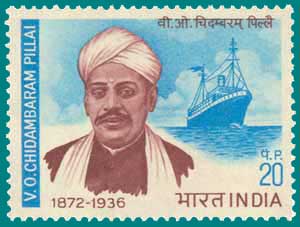One of India’s greatest patriots was V.O. Chidambaram Pillai (1872 – 1936), a brilliant lawyer and a courageous leader whose life is a saga of struggle and sacrifice for his cause. The first Indian to launch a ship service, he is remembered for the pioneering role he played in building India’s shipping industry. His efforts in this field earned him the name Kappalotiya Thamizhan (the Tamilian seafarer).
Chidambaram was born on September 5, 1872 in Ottapidaram in southern Tamil Nadu. His father, Ulaganatha Pillai, was a leading lawyer. After completing his primary education
in a local school, Chidambaram was sent to Tuticorin for higher studies. A diligent student, he was also a keen sportsman and a gifted poet. As he belonged to a family of lawyers, it was natural for him to specialise in law. He obtained a law degree in 1895. The same year, he was married to a girl named Valliammai.
He began practising law at the sub-magistrate’s court in Ottapidaram. A principled man, he took up cases of the poor even though they could not pay him much, unlike his father who
catered only to rich and influential clients. He was angered by the rampant corruption in the courts. In 1900, he proved corruption charges against three submagistrates, infuriating his
father, who ordered him to leave home. Undaunted, he moved to Tuticorin and began practising there.
In 1901, Chidambaram – by now known as VOC – faced a personal tragedy when his wife
Valliammai passed away. He later remarried, and his second wife Meenakshiammal
was a great source of support for him.
The partition of Bengal in 1905 triggered off a wave of anti-British sentiment. The Swadeshi movement led by Tilak became popular all over the country. It had a deep impact on VOC too. Closing down his law practice, he plunged into the movement with great fervour. He made a bonfire of all his possessions that were of foreign origin. Once he even stormed out of his barber’s shop, half shaven, because he discovered that the barber was using a British razor!
Living in a coastal town, VOC saw that the shipping industry was monopolised by the British.
Now, his thoughts turned to the great tradition of south Indian maritime trade established by the Chola and Pallava dynasties. He was inspired to break the British monopoly by starting an indigenous shipping company
Some local merchants helped him with loans and thus, in October 1906, the Swadeshi Steamship Company was born. VOC started business by renting two ships and plying them
between Tuticorin and Colombo. But he knew that the company could not run indefinitely without its own ships. He travelled to all of India’s major cities, addressing meetings to mobilise funds for his cause. Moved by his oratory, people donated generously. VOC bought two ships – the SS Gaelia and SS Lawoe. They began plying regularly along the trade routes (where only British ships had sailed earlier), and the company flourished. Passengers
boycotted the British ships and sailed by Swadeshi ships alone.
The British shipping company retaliated by reducing its fares, eventually offering all its
passengers free rides. The Swadeshi Company could not compete with this, and within
three years was on the verge of bankruptcy.
Meanwhile, VOC had also become involved in trade unionism. In 1908, he led a strike at a Britishowned textile mill, demanding higher wages for workers. He was arrested on charges of sedition.
VOC’s arrest caused an unprecedented outcry, with violent protests all over the region. His trial was covered by all the national newspapers, and funds poured in to support his cause not just from all over India but even from Tamils in South Africa.
VOC was sentenced to rigorous imprisonment. In jail he was treated not like a political prisoner but like a common criminal. He was given insufficient food and forced to do hard
labour. By the time he was released in 1912, he was a broken man. His shipping company had been liquidated to pay his debts and he was barred from practising law.
The rest of his life was a long struggle with poverty and ill health. On November 18, 1936, the great patriot breathed his last.




